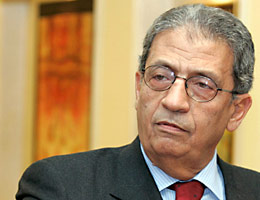INTERVIEW: Arab League's Amr Mussa impatient on Arab-Israeli peace
 Doha - Arab League Secretary General Amr Mussa knows the new Israeli prime minister, Benjamin Netanyahu, well.
Doha - Arab League Secretary General Amr Mussa knows the new Israeli prime minister, Benjamin Netanyahu, well.
In the 1990s, Mussa was Egypt's foreign minister when Netanyahu was Israel's prime minister. And while the two men share a taste for fine Cuban cigars and other small indulgences, and though the countries they represented in the 1990s had been at peace for more than a decade, the two were often at odds on politics.
Little has changed today.
"It has become exceedingly difficult to speak of the Arab-Israeli peace process," Mussa told the German news agency dpa on the sidelines of the Arab-Latin American summit on Tuesday, only hours after Netanyahu announced the formation of his government.
"There is hardly an Arab-Israeli peace process left anymore," he said.
Reacting to the news that Netanyahu had formed a coalition of mostly right-wing parties, Mussa did not seem as alarmed as did other Arab diplomats gathered in Qatar.
"Spare me this talk," he said. "We should really spare ourselves this talk. Right and left mean very little in Israel when it comes to Arab, and especially Palestinian, rights."
"Who was it that wrecked what little was left of the Arab-Israeli peace process during the past few years? It was Kadima, not Likud. So let us be realistic," he said.
Mussa has long experience with the Arab-Israeli peace process. In 1967, he was a junior diplomat with the Egyptian mission in New York when the United Nations Security Council passed Resolution 242.
The resolution called on Israel to "withdraw from territories occupied during the recent conflict" and for all states in the region to respect others' "right to live in peace within secure and recognized borders free from threats and acts of force."
Since that day, Moussa was almost always present when Arab-Israeli peace was discussed, criticized, advanced, or resurrected. Throughout, he remained an implacable critic of Israel.
"The consecutive Israeli governments have done very little for peace with the Palestinians," he said on Tuesday. "At times they have done nothing, and at times they have done a great deal of harm to the prospects for peace. The peace process has evolved into much deception and many illusions."
But if Mussa is cynical about the peace process, he still believes peaceful negotiations are the only solution.
"But negotiations cannot be endless, with confused or fudged terms and no honest broker," he said.
Mussa said he cannot agree with those who propose suspending the Arab peace initiative first proposed by Saudi Arabia in 2002 and subsequently ratified by the Arab League. Nor, he said, can he agree to keep the initiative on the table forever.
"Everything has to have a deadline," he said. "Everything must be addressed within its context; this is what I believe."
"We keep this initiative because it is about our terms of reference and our vision of how peace could be made, but the hand Arabs extended for peace when they adopted this initiative in 2002 will not remain hanging there forever."
"Any Israeli government, whatever parties it is made of, must realize this fact: the Arab peace initiative must be acknowledged and reciprocated," said Moussa.
This, he said, was the essential message the Doha Arab League summit sought to deliver to Israel, "not to a particular government but to Israel as a whole." (dpa)